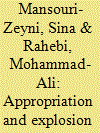| Srl | Item |
| 1 |
ID:
132102


|
|
|
|
|
| Publication |
2014.
|
| Summary/Abstract |
The two of us wrote Anti-Oedipus together. Since each of us was several, there was already quite a crowd.
-Deleuze and Guattari, A Thousand Plateaus
With the linguistic turn came an ever-increasing tendency to see language as the locus where truths are born, passed along, or modified. As such, postmodern theories have proved highly compatible with postcolonial studies, which have inspired studies of modern Iran as a country that was colonized, only not officially. However, the latter seem to have fallen for extreme abstraction where metaphysical claims abound: presuming constructivist views of language but failing to present a tangible framework, these studies discuss "discursive change" without giving a clue as to what either discourse or change is. Convinced as such, we have adopted Wittgenstein's idea of language-games to present a tangible model for discursive change.
|
|
|
|
|
|
|
|
|
|
|
|
|
|
|
|
| 2 |
ID:
144060


|
|
|
|
|
| Summary/Abstract |
Scholars from the recent ‘practice turn’ in International Relations have urged us to rethink the international realm in terms of practices. The principal exponents of the turn, Emanuel Adler and Vincent Pouliot, have refurbished Pierre Bourdieu’s theory of practice to produce their own account of international practices. In a review of the practice turn, Chris Brown has argued that Bourdieu’s notion of practice shares basic affinities with Aristotle’s concept of praxis. While practice turn scholars may not adhere to a rigid canon of thought, they seem to share an Aristotelian conception of praxis. This reading of the turn to practice, though plausible, captures one part of the story. The central thesis of the present article is that instead of one there are two, distinctive conceptions of practice – Aristotelian and Wittgensteinian – and therefore two distinctive ways in which the character of international practices might be understood. More concretely, the aim is to show that the conception of international practices, rooted in Wittgenstein’s view of practices as language-games, can be particularly illuminating to all those who seek to understand international relations.
|
|
|
|
|
|
|
|
|
|
|
|
|
|
|
|